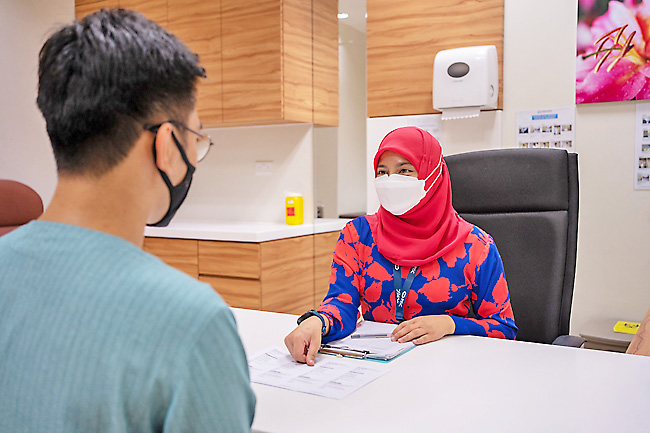Contributed by Siti Fairuz Abd Latiff, Medical Social Worker, Head of Medical Social Work Department, Pantai Jerudong Specialist Centre
Medical social workers are part of a multidisciplinary team of allied health professionals providing care to patients during the acute phase, inpatient rehabilitation, and outpatient rehabilitation.
They serve an exceptionally critical function in hospitals and are relied upon by patients and families to help navigate life’s most challenging moments.
Every day at Pantai Jerudong Specialist Centre (PJSC), medical social workers meet their patients. Many of these patients have medical conditions which may affect their physical and psychosocial wellbeing.
Some patients face medical conditions such as stroke, cancer, and neurological problems, while others may undergo rehabilitation treatment or reconstructive surgery. PJSC’s medical social workers communicate with patients to understand their needs and challenges.
Some patients may face socioeconomic or psychosocial problems. These problems range from carer issues, financial constraints, family conflict, or domestic violence.
Medical social workers provide guidelines to PJSC’s multidisciplinary team for referral. They also help identify patients’ main carer and home destination upon discharge. This is where medical social worker’s assessment is fundamental.

Once medical social workers receive a referral with the issues indicated, they will begin psychosocial assessment to understand the patient’s family dynamic and financial situation.
This is a part of information gathering to explore facts and feelings, making judgements, and determining recommendations medical social workers could offer towards the patient or their families.
During a patient’s assessment, medical social workers will explore their understanding with regards to the medical condition, their discharge planning, concerns and support they will require.
It is also worth observing their body language, interpretation, and their views for medical social workers to respond appropriately. This is where most issues from the past to present are brought up where some circumstances are complex and complicated to intervene.
However, it helps medical social workers detect red flags and explore ways that can assist the patient and the family.
Information will be shared among the multi-disciplinary teams involved (consultants, medical officers, nurses, and allied health professionals for example the occupational therapists, physiotherapists, speech and language therapists, dieticians, or clinical psychologists) to help medical social workers understand the reason behind the patients’ decision and struggles.
Their opinion and expertise are important before any decisions or advice could be offered to the patients or families.
Information gathering may require frequent consultation and negotiation with the patients and families. Referrals to relevant agencies such as Community Development Department, Brunei Islamic Religious Council or other non-government organisations are also necessary when further support is required by the patients.
As problems are revealed, medical social workers need to break it down and prioritise the unmet needs, particularly physiological and the patient’s safety. Once intervened, they will move on to other matters mentioned gradually. Medical social workers will also suggest ways they can cooperate with the intervention process. Their cooperation is essential to decide and plan the proper course of actions.
Medical social workers are involved with socioeconomic and psychosocial circumstances and proper assessment is crucial to investigate the underlying problems for each patient. This extends to patients’ family members, which enables to gain a better understanding behind their behaviour and decisions made.
Additionally, it gives them a chance to be heard on matters that they hardly shared with anyone else and to reach out for help.
The information collected helps with the intervention process and to engage relevant agencies to consider giving them the support they need.
Any enquiries or concerns that can help patients’ needs can be raised through the Medical Social Work (MSW) Department of PJSC.
The public is also welcome to donate and contribute to support patients and their families by providing supplies, milk powder, and diapers, as well as other daily essentials or assistance that might help relieve their challenges in their daily life.






